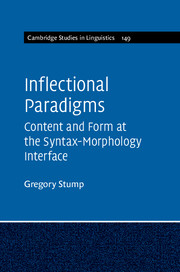Book contents
- Frontmatter
- Dedication
- Contents
- List of figures
- List of tables
- Acknowledgements
- List of abbreviations
- List of symbols and operators
- Introduction
- 1 What are inflectional paradigms?
- 2 Canonical inflectional paradigms
- 3 Morphosyntactic properties
- 4 Lexemes
- 5 Stems
- 6 Inflection classes
- 7 A conception of the relation of content to form in inflectional paradigms
- 8 Morphomic properties
- 9 Too many cells, too few cells
- 10 Syncretism
- 11 Suppletion and heteroclisis
- 12 Deponency and metaconjugation
- 13 Polyfunctionality
- 14 A theoretical synopsis and two further issues
- References
- Index
4 - Lexemes
Published online by Cambridge University Press: 18 December 2015
- Frontmatter
- Dedication
- Contents
- List of figures
- List of tables
- Acknowledgements
- List of abbreviations
- List of symbols and operators
- Introduction
- 1 What are inflectional paradigms?
- 2 Canonical inflectional paradigms
- 3 Morphosyntactic properties
- 4 Lexemes
- 5 Stems
- 6 Inflection classes
- 7 A conception of the relation of content to form in inflectional paradigms
- 8 Morphomic properties
- 9 Too many cells, too few cells
- 10 Syncretism
- 11 Suppletion and heteroclisis
- 12 Deponency and metaconjugation
- 13 Polyfunctionality
- 14 A theoretical synopsis and two further issues
- References
- Index
Summary
An inflectional paradigm specifies the word forms realizing a particular lexeme. Like phonemes in phonology, lexemes are a theoretical abstraction: Just as phonemes serve to classify the speech sounds composing a spoken utterance (allowing, for example, the [tʰ] in [tʰɑp], the [t] in [stɑp], the [ɾ] in [ˈbɛɾɚ] and the [ʔ] in [ˈbʌʔn̩] to be classified as instances of the English phoneme /t/), so lexemes serve to classify the word forms composing a sentence (allowing, for example, the word forms go, goes, went, gone and going to be classified as instances of the English lexeme go). The term “lexeme” is therefore only meaningful in the context of a theory of the lexicon and its interface with morphology, syntax and semantics. Here, I discuss the fundamental properties of lexemes within this theoretical context (Section 4.1), the relation between lexemes and lexical entries (Section 4.2), and the incidence of noncanonical lexical entries (Section 4.3), briefly summarizing in Section 4.4.
What is a lexeme?
A lexeme is (i) a lexical abstraction that (ii) has either a meaning (ordinarily) or a grammatical function, (iii) belongs to a syntactic category (most often a lexical category), and (iv) is realized by one or more phonological forms (canonically, by morphosyntactically contrasting word forms). All four components of this characterization have been sources of misunderstanding and sometimes disagreement, and therefore deserve some elaboration. (See also Bauer 2000.)
A lexeme is a lexical abstraction
Lexemes are sometimes equated with lexical entries, but there are lexical entries that aren't lexemes (e.g. multiword idioms) as well as lexemes that don't exist as lexical entries (e.g. productively created lexemes such as the compound noun city garbage report); see Di Sciullo and Williams (1987: Ch. 1). Lexemes are lexical abstractions in the sense that
(a) lexemes themselves have no phonological form, but they are realized by expressions that do have phonological form – by word forms, ordinarily;
(b) a lexeme's syntactic category and semantic content are either listed in its lexical entry or are determined by the properties of other lexemes in accordance with rules of “word formation” (a potentially misleading term intended to subsume the phenomena of compounding and derivation); and
(c) the expressions that realize a lexeme may be listed as part of its lexical entry or may be determined by inflectional rules.
Information
- Type
- Chapter
- Information
- Inflectional ParadigmsContent and Form at the Syntax-Morphology Interface, pp. 58 - 66Publisher: Cambridge University PressPrint publication year: 2015
